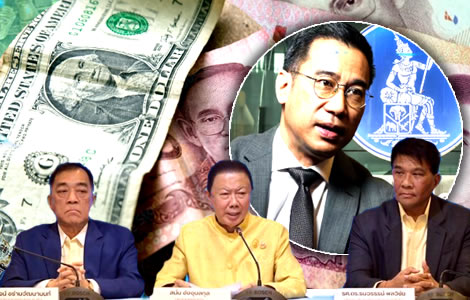Thai baht rockets 12.5% against USD as foreign inflows surge. Business leaders urge central bank action to protect exports, tourism, and the economy from losses exceeding ฿130 billion. US Federal Reserve cuts fuel speculation on Thailand’s next move.
The long-awaited US Federal Reserve interest rate cut this month of 50 basis points, together with weaker US economic data, have caused a sea change in financial capital flows. In short, the Thai baht has risen like a rocket against the US dollar. The rate of appreciation, strengthened by an elevated price for gold, is already a serious cause of concern for the kingdom’s business sector. It threatens the competitiveness of Thai exports and the country’s recovering foreign tourism industry. The baht has gained no less than 12.5% against the US dollar since April 30th, 2024. At the very least, the strength of the baht at this time will wipe out any gains for the economy due to the government’s ฿150 billion cash stimulus.

The Thai baht has surged to its strongest level in 30 months. On Wednesday, it reached ฿32.63 against the United States dollar. By close of business on Thursday, it was ฿32.47.
This rise is attributed to a number of drivers. Firstly, the decisive 0.5% cut in US interest rates by the Federal Reserve last week. On April 30th this year, the baht against the US dollar stood at ฿37.18.
That is a 12.5% appreciation in under six months.
Certainly, changes in international money markets have unleashed torrents of funds heading east. In particular, it is a reversal of what was seen in 2023 and at the beginning of 2024.
Indeed, a range of analysts, including the Federal Reserve itself, predict further US interest rate cuts, meaning this rally of the baht may even strengthen.
Gold prices and China’s stimulus measures bolster the baht’s surge, pressuring Bank of Thailand to act
At the same time, it has also been reinforced by rising gold prices. Uncertainty presently holds sway globally as the world’s geopolitical crisis worsens.
Furthermore, reports in China of economic stimulus measures, as it seeks to prime its economy, have boosted global risk assets. The Bank of Thailand (BoT) is now under pressure to intervene.
US Federal Reserve rate cut piles pressure on Bank of Thailand and its governor who is holding firm
On Wednesday morning, the baht rose by as much as 0.8%, a level not seen since March 2022. Increased foreign inflows into equities and bonds contributed to this positive sentiment. The benchmark stock index is nearing a one-year high.
However, this surge has raised concerns among exporters. In brief, a strong baht can hurt export competitiveness and tourism, two vital sectors of Thailand’s $500 billion economy.
Consequently, calls for central bank intervention are growing louder. There is speculation that interest rate cuts may be necessary to shield these sectors from the baht’s appreciation.
Central bank cautious as baht appreciation challenges economic stability. Awaiting further US dollar weakness
Christopher Wong, a currency strategist at Oversea-Chinese Banking Corp Singapore, commented on the situation. “The topic of a strong baht is already on the agenda of policymakers,” he said.
However, he cautioned that if a weak dollar becomes a dominant trend, intervention may be less likely. “At this point, it is likely they may wait and watch, but we cannot rule out any responses.”
Finance Minister Pichai Chunhavajira and Bank of Thailand Governor Sethaput Suthiwartnarueput are scheduled to meet next week.
The strong baht will be on their agenda, with decisions on interest rates expected in October. In September, global fund managers poured over $400 million into Thai bonds, marking the third consecutive month of net foreign inflows.
Additionally, about $1 billion of local equities were bought during this period. This influx is partly due to the government’s new fund-subscription offer aimed at reviving the local market.
Thai Chamber of Commerce warns baht appreciation could cause ฿130 billion economic loss. Proposes plan
However, the Thai Chamber of Commerce warns that the strong baht could destroy the economy. At this time, it is estimating potential losses of ฿130 billion. Mr. Sanan Angubolkul, Chairman of the Thai Chamber of Commerce, emphasised the urgency of the situation.
He proposed a range of policies that align with the government’s initiatives to stimulate the economy.
Immediate measures for economic relief: The government should expedite ฿10,000 baht cash handouts to stimulate purchasing power. A dual project is further suggested where the government matches contributions to encourage spending.
Debt management for entrepreneurs: Immediate measures are necessary to assist businesses struggling with debt. Options may include debt suspension or reduction to improve liquidity for small businesses.
Industry-specific solutions: The business leader urged the government to tackle pressing issues such as foreign goods dumping. Meanwhile, he also called for green initiatives to support local businesses.
Strong baht impacts Thailand’s exports and tourism, calls for immediate action to stabilise the currency
Mr. Poj Aramwattananon, the First Vice Chairman of the Thai Chamber of Commerce, emphasised at length the adverse effects of a strong baht.
The currency’s appreciation by over 10% has severely impacted the export and tourism sectors. For instance, agricultural exports, including rice and chicken, which rely heavily on domestic raw materials, are now less competitive.
Tourism is undeniably also at risk. A strong baht makes Thailand a more expensive destination for foreign visitors, which could potentially slow down tourism and consequently affect small businesses such as hotels and restaurants.
The Chamber of Commerce has urged the government and relevant agencies to address the strong baht urgently. In particular, they are calling for the central bank to maintain the baht’s stability.
Furthermore, they want action to prevent excessive fluctuations and a move to align its value with economic realities. Similarly, the Bank of Thailand is also encouraged to expedite interest rate reductions to support small and medium enterprises (SMEs).
Thai government and central bank consider interventions to curb baht’s rise amid rising concern
On Tuesday, Minister of Commerce Pichai Naripthaphan said that intervention was urgently required. He said a Thai baht at ฿35 – ฿36 to the US dollar was presently appropriate. The rapid appreciation of Thailand’s currency against the dollar threatens to impair economic growth.
Mrs. Kobsuk Iamsuri, President of the Rice Exporters Association, noted that every 1 baht appreciation raises the price of Thai rice by $15 per ton. This significantly reduces competitiveness against countries like Vietnam and Pakistan.
With major rice-exporting countries ramping up their shipments, Thai rice exports may struggle in the coming year.
Additionally, Mr. Thanawat Polvichai, President of the University of the Thai Chamber of Commerce, emphasised that the U.S. Federal Reserve’s recent rate cut creates an opportunity for the Bank of Thailand to consider similar measures.
Lowering interest rates could help prevent further baht appreciation, benefiting export and service sectors.
Tourism high season and political uncertainty could further fuel baht appreciation. Urgent action is needed
At this point, there appears to be a powerful wind behind the baht’s appreciation. Coming into the high season for tourism and uncertainty over the US Presidential election will strengthen the storm.
Undoubtedly, the central bank and the Monetary Policy Committee will be dealing with a charged situation at its next meeting, scheduled for Wednesday, October 16.
The committee is chaired by Bank of Thailand Governor Sethaput Suthiwartnarueput, with Mrs. Alisara Mahasandana, deputy governor, as Vice Chair.
The baht’s continued appreciation could result in a loss of ฿130 billion baht in export and tourism revenue, potentially dragging down Thailand’s GDP by 1%. However, the proposed cash handout measure now in progress could stimulate the economy.
The welfare card initiative, worth about ฿150 billion baht, may help Q4 GDP grow by 3.8-4.3%. This could still keep overall GDP growth estimates for the year between 2.6% and 2.8%.
Join the Thai News forum, follow Thai Examiner on Facebook here
Receive all our stories as they come out on Telegram here
Follow Thai Examiner here
Further reading:
US Federal Reserve rate cut piles pressure on Bank of Thailand and its governor who is holding firm
Central bank holds interest rates. Economy will grow 2.6% in 2024 as Srettha pushes home ownership
Economy unlikely to grow in first quarter as Thai manufacturing crumbles. Hard choices ahead
New Finance Minister expected in April as economic malaise deepens with downgrades in GDP growth
Digital Wallet plan blown out of the water by corruption body on Tuesday warning of illegality


















